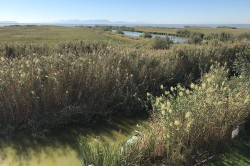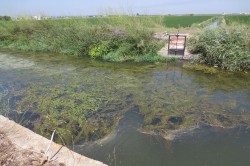Press Release, 18. December 2023
Water management in the Mediterranean
UFZ coordinates intereuropean project for sustainable water management
Climate change and human impact are causing increasing water security problems in the Mediterranean region. It is therefore becoming more and more important to properly manage the available water resources accounting for the water needs of various users. In the recently launched EU-funded OurMED project, an international team of researchers led by the UFZ will be developing integrated water management concepts for eight demonstration sites across the Mediterranean by June 2026.

Photo: Miguel Martín (Technical University of Valencia)

Photo: Miguel Martín (Technical University of Valencia)
The Mediterranean region is a unique mosaic of cultures and climate zones characterised by a blend of inhabitants, natural environments and a diversity of species. However, rapid population growth, urbanisation and intensive agriculture in many areas are threatening the quantity and quality of water and the associated ecosystem services. The region is also a hotspot for climate change. As a consequence, the Mediterranean region is suffering increasingly from periods of drought, low river levels and dry soil. These problems all further impact water management.
The goal of the OurMED project, which was launched in the summer of 2023, is to optimise and better manage natural and artificial water storage systems such as lakes, reservoirs, rivers and aquifers. To increase the acceptability of project findings, interest groups from agriculture, water supply and nature conservation will be included throughout the decision-making process. The researchers will combine monitoring, modelling and easy-to-implement technologies, such as nature-based solutions, for fair water distribution. "In the OurMED project, we want to structure water resource management so as to give equal consideration to the various water users. We want to ensure access to freshwater in sufficient quantity and quality for households and agriculture, while simultaneously protecting natural ecosystems," says UFZ hydrologist and project coordinator Dr. Seifeddine Jomaa. Only in this way we can achieve sustainable water management in the Mediterranean region in the face of increasing water scarcity and environmental challenges. "However, we will not only improve the instruments for management, we will also improve the integration and sharing of available data, services and technologies as well as local knowledge, thereby making them accessible across regions," says Seifeddine Jomaa.
The OurMED project area includes a total of eight demonstration sites, primarily in the Mediterranean region. These include the catchment areas of Agia (Crete, Greece), Konya (Turkey), Mujib (Jordan), Medjerda (Tunisia), Sebou (Morocco), Arborea (Sardinia, Italy), and Júcar (Spain) in addition to the Bode catchment (Germany). The Júcar local water authorities have succeeded in stopping the decline of the groundwater table in some of their aquifers and in developing expertise in water management under extremely difficult semi-arid conditions. "The reversal of the negative groundwater trend in the largest aquifer within the Júcar catchment shows that it is possible to provide for greater sustainability in water management," says Prof. J. Jaime Gómez-Hernández, project partner from the Technical University of Valencia. OurMED will collaborate with the Júcar River Water Authority in passing on their insights to the other project areas.
At the same time, Júcar can benefit from the results obtained in the other areas. For example, knowledge that the UFZ scientists have gained on the Bode River in the Harz Mountains will be applied to improve the condition of the Albufera Lake close to the mouth of the Júcar River, which is overloaded with nutrients. Despite being outside the Mediterranean region, the Bode catchment area in Saxony-Anhalt is of particular interest because, with the Rappbode Dam, it not only includes Germany's largest drinking water reservoir and the most fertile soils for agriculture, but also because it is one of the most highly studied river basins in Central Europe. The Bode catchment area has been affected by a prolonged drought in recent years, which has adversely affected both water quantity and quality due to the simultaneous occurrence of heavy deforestation. "The findings from this area can provide an example for other project sites with diffuse pollution problems where innovative monitoring and scientifically sound solutions are lacking," says Prof. Dr. Michael Rode, who is responsible for UFZ's OurMED activities in the Bode catchment area. However, the goal is not only to find solutions for the respective demonstration site areas, but also to upscale these solutions for the entire Mediterranean region. "This should ensure that the solutions developed can also be applied to larger areas," says project coordinator Seifeddine Jomaa.
The OurMED project, to continue until the summer of 2026, is supported by a grant of 4.4 million euros from the PRIMA (Partnership for Research and Innovation in the Mediterranean Area) program under the EU Horizon 2020 research and innovation program. The project consortium includes 15 partners from 10 countries: UFZ, Remote Sensing Solutions GmbH (Germany), Technical University of Valencia (Spain), Global Omnium Idrica (Spain), Euro-Mediterranean Information System on know-how in the Water sector (France), La Tour du Valat (France), Technical University of Crete (Greece), University of Parma (Italy), University of Sassari (Italy), University of Naples Federico II (Italy), Royal Society for the Conservation of Nature (Jordan), Living Planet Morocco (Morocco), AgroInsider (Portugal), Higher School of Engineering of Medjez El Bab (Tunisia), and Bo?aziçi University (Turkey).
More information: https://www.ourmed.eu/
Further information
Dr. Seifeddine Jomaa
UFZ Department of Aquatic Ecosystems Analysis
seifeddine.jomaa@ufz.de
Prof. Dr. Michael Rode
UFZ-Department Aquatische Ökosystemanalyse
michael.rode@ufz.de
UFZ press office
Susanne Hufe
Phone: +49 341 6025-1630
presse@ufz.de
In the Helmholtz Centre for Environmental Research (UFZ), scientists conduct research into the causes and consequences of far-reaching environmental changes. Their areas of study cover water resources, ecosystems of the future, environmental technologies and biotechnologies, the effects of chemicals in the environment, modelling and social-scientific issues. The UFZ employs more than 1,100 staff at its sites in Leipzig, Halle and Magdeburg. It is funded by the Federal Government, Saxony and Saxony-Anhalt.
www.ufz.deThe Helmholtz Association contributes to solving major challenges facing society, science and the economy with top scientific achievements in six research fields: Energy; Earth and Environment; Health; Key Technologies; Matter; and Aeronautics, Space and Transport. With some 39,000 employees in 19 research centres, the Helmholtz Association is Germany’s largest scientific organisation.
www.helmholtz.de